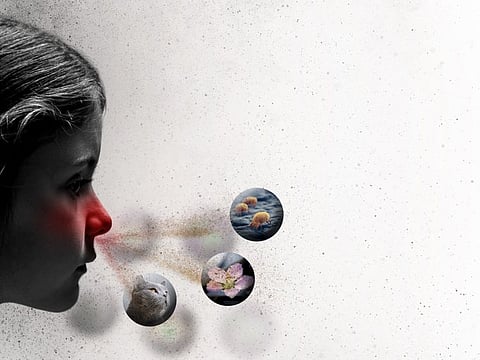How to keep allergic rhinitis in check
Experts explain why proper treatment is necessary to prevent its progression to asthma

Take it from a parent whose offspring suffers from allergic rhinitis that it’s not pretty. From recurrent sneezing that marks the beginning of the day to runny nose, itchy eyes and nasal congestion in the night that doesn’t allow proper sleep, this chronic condition of the nose can seriously impact a patient’s quality of life.
More than 400 million people around the world are affected by allergic rhinitis due to exposure to airborne allergens such as dust, pet dander, dust mites, mould and pollen. About 10-30 per cent of adults and 40 per cent of children globally are estimated to suffer from the condition. A common allergy, if not the most common, in the UAE, it remains underdiagnosed and undertreated here too just as around the globe.
One of the problems of lack of proper treatment is the possibility of allergic rhinitis developing into asthma. “Allergic rhinitis and asthma are often associated and the two disorders interact at various levels,” explains Dr Polixenia Yadegari, Specialist Paediatrician at Medcare Paediatric Centre - Children’s Medical Centre. “Rhinitis typically precedes the development of asthma and can contribute to unsatisfactory asthma control. The presence and type of asthma is influenced by sensitisation and the duration and severity of allergic rhinitis.”
Rhinitis typically precedes the development of asthma and can contribute to unsatisfactory asthma control.Dr Polixenia Yadegari, Specialist Paediatrician at Medcare Paediatric Centre - Children’s Medical Centre
Dr Anuradha Ajesh, Specialist – Paediatrics at Bareen International Hospital - MBZ City, Abu Dhabi, presents some statistics to reiterate that allergic rhinitis is a critical risk factor in developing asthma and causes non-optimal control of asthma. “A study found that 78 per cent of asthma patients have allergic rhinitis, while 38 per cent of allergic rhinitis patients have asthma.
“Most children with moderate persistent and severe persistent allergic rhinitis and about 33 per cent of mild persistent allergic rhinitis may develop asthma.”
Most children with moderate persistent and severe persistent allergic rhinitis and about 33 per cent of mild persistent allergic rhinitis may develop asthma.Dr Anuradha Ajesh, Specialist – Paediatrics at Bareen International Hospital - MBZ City, Abu Dhabi
That’s one more reason for parents and patients alike to take allergic rhinitis more seriously. Instead of dismissing its symptoms such as runny and stuffy nose as yet another bout of common cold, patients need to undergo a thorough check-up and start the right medication. “Since temporary relief can be seen by obtaining over-the-counter medications, many continue to be underdiagnosed and usually present at a later stage with complications of the disease,” explains Dr Samith Alva, Specialist Paediatrician at Aster Clinic, JLT.
Since temporary relief can be seen by obtaining over-the-counter medications, many continue to be underdiagnosed and usually present at a later stage with complications of the disease.Dr Samith Alva, Specialist Paediatrician at Aster Clinic, JLT
Once the diagnosis is made, the next step is to identify the allergen and reduce the patient’s exposure to it. Dr Basel Nasrallah, Consultant Paediatrician and Allergy Specialist at American Hospital Dubai, says house dust mites are the most common cause for allergic rhinitis in the UAE, followed by pet dander and grass and tree pollens.
Dust mites live on bedding and carpets and feed on dead skin cells that we shed every day and it is extremely difficult to eliminate them. But dust mite-proof pillow and mattress cases that don’t allow these micro-organisms to penetrate through them have been proven to be successful in controlling patients’ exposure to these allergens. Make it a point to wash sheets and blankets in warm water with detergent and dry them in dryers to get rid of them.
However, sometimes removing the allergens isn’t enough.
“We also have to start medical treatment to treat the symptoms of AR such as nasal blockage, itchiness and sneezing,” explains Dr Nasrallah. “These nasal medications are steroidal sprays for the nose, which should be taken regularly over periods of time. The child also needs oral antihistamine medications to stop all symptoms of allergic rhinitis.”
As both allergic rhinitis and asthma are inflammatory disorders with similar pathophysiology, they share treatment approaches as well, says Dr Alva. “Since the mainstay of treatment for both are steroids, parents have to be educated and informed about the proper use of medications and unnecessary fear about steroids have to be allayed.”
Dr Nasrallah believes the best treatment for allergic rhinitis is immunotherapy, which can be given as shots or drops under the tongue. “With immunotherapy, you don’t just treat the symptoms but also try to make the immune system of the patient get used to allergens by giving small amounts over a period of time so that the body will not become allergic anymore to the causative allergens.”
However, there is evidence that treating allergic rhinitis with immunotherapy, especially if it is caused by house dust mites, will help it from progressing to asthma.Dr Basel Nasrallah, Consultant Paediatrician and Allergy Specialist at American Hospital Dubai
Both asthma and allergic rhinitis have multifactorial causes with genetics and environment playing a major role in their development. “However, there is evidence that treating allergic rhinitis with immunotherapy, especially if it is caused by house dust mites, will help it from progressing to asthma,” say Dr Nasrallah.


